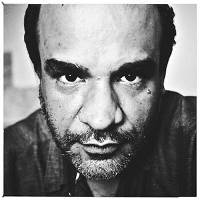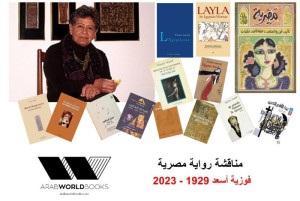Hikayat min Fadlala Osman (Stories from Fadlala Osman),
Ibrahim Aslan, Cairo: Miret, 2003
by Youssef Rakha
Ibrahim Aslan's last book, Hikayat min Fadlala Osman (Stories from Fadlala Osman) was all but ignored amid the excitement generated by Khulwat Al-Ghalban (The Poor Man's Hermitage), his penultimate, published by Dar Al- Shurouq earlier in 2003. One of few Sixties generation books to appear with the mainstream press, Khulwat Al-Ghalban was promoted as "unprecedented non-fiction by a fiction writer of refinement who added to the canon". A collection of journalism -- reflective, anecdotal or explicitly autobiographical -- it lived up to Aslan's reputation for humour and poetic economy.
Hikayat min Fadlala Osman is interesting because many of the pieces it strings together, though intended as short stories, have the same unmediated relation to reality. Formally it is closer to Khulwat Al-Ghalban than Buhayrat Al- Massaa' (Evening Lake), Aslan's first collection of short stories, though it preserves what Khulwat Al-Ghalban manages to dispense with, the sense of wholeness found in Aslan's books irrespective of genre, with each focussed on a set of characters or theme.
Fadlala Osman is one of the main streets in Kitkat, Imbaba, the setting of Malik Al-Hazin (Heron), Aslan's best known novel.
Opening with an entryway in which two neighbours sitting on the pavement that leads into the street have a casual disagreement -- endearing, telling, hilarious dialogue -- Hikayat min Fadlala Osman ends with a vision, written like a prose poem, of a nude in a tesht, a portable bathtub: "What is gone is gone,/And there remains in the mind/A room empty but for a beautiful nakedness,/A burnished mirror,/The hint of a breast/And steam."
In the space separating the two, surveying street inhabitants in typical situations, Aslan depicts the ages and humours of intimately familiar man, producing a kind of discontinuous novel about inner-city life in contemporary Cairo.
The flexibility of the short text -- seldom does a piece exceed a few pages -- allows for a range of voices from the confessional to the socially aware, and this results in a perspective of almost anthropological scope. Aslan's powers of observation and his ear for dialogue unravel the mysteries of mind and matter with subtlety and vigour; the subjects function as social types -- they are frequently victims of economic deprivation -- even as they make distinctly individual impressions.
When Abdel-Azim Imara reclines alone in the bedroom, having told his wife Wasfiya he will never go back to work -- the piece is an example of Aslan's socially aware voice -- Hagg Sami, an old, devout neighbour, is called in to remind him of "the expenses of house, and food, and kids". Humbly he refuses to let Abdel-Azim get up to greet him, but when the latter pulls him along into bed, and they are warming to each other at this point, the bed collapses. In the riot that results Wasfiya is quivering in the arms of another neighbour, "It seems Abdel-Azim has beaten up Hagg Sami, and he says he won't go to work."
Elsewhere a peculiar "Ustaz" ropes the nameless narrator into visiting the street's ailing undertaker, Abdel-Khaleq -- an example of Aslan's confessional voice -- and on the visit the writer's alter ego encounters the stub of a tree trunk that he "knew as a tree in childhood". On their way out the Ustaz -- by the undertaker's bedside he optimistically proffers medical advice -- asks the narrator his "opinion" of Abdel-Khaleq's state, and goes on to declare, with knowing equanimity, that "for your information, Abdel-Khaleq the undertaker is dying." Seconds later screaming echoes through the alleyway, confirming the prediction; the Ustaz rushes back, and in order not to be obliged to follow him, the narrator paces slowly up Fadlala Osman, trying to give the impression that he is looking for something he dropped.
More disturbing, if equally funny, is Aslan's own "Extremity of Family History", an account of the amputation of his diabetic brother's leg, which involves official "receipt of the leg", a task he refuses to perform, forcing his brother-in-law to oblige in his stead. Interspersed with descriptions of the family's responses to the calamity, the macabre strangeness of part of a leg being treated just like a dead body -- washed, wrapped in cloth and buried -- seems to reflect the fabulously tragic inflections of life in Fadlala Osman, where both brothers grew up.
Towards the end of the book the texts become shorter and shorter as Aslan abandons himself to the stream of consciousness, seeming to depart from Fadlala Osman but perhaps, in reality, exploring its psychic depths.
"I must've left a while back," so begins Samt ("Silence", quoted here in its entirety), "because I was standing at the edge and I could see the large yellow disk hanging at the start of the road at the other end of the dark iron bridge, flickered in the leaves of trees, and because I was cheerful, "and tired, "and solitary.
"I crossed through the river of the street until I ended at the polished glass fa�ade and saw him before me in night clothes, with that strange face I knew and the sad eyes, and buried the knife that lay between us in his chest with pain and ease, and extended my hands to his armpit to support him and saw him in the dark polished surface raise his hands to mimic me and fall slowly, resting his back and stretching his legs and laughing sarcastically before he died in the soft daylight which drives the steam off the face of the river, taking it up to the shore and crossing the road and stepping on the pavement and ascending the walls with it and drowning me while I opened the door to a small balcony and sat wrapped up in warm clothes. Over there I could see him wrapped up in the clothes of death, a group of people talking over him, and not a sound reaching me."
The juxtaposition of incompatible modes of writing has led critics in the thrall of the earlier book to dismiss Hikayat min Fadlala Osman as an irrelevant addendum. Yet it is in the present book, not in Khulwat Al-Ghalban,




